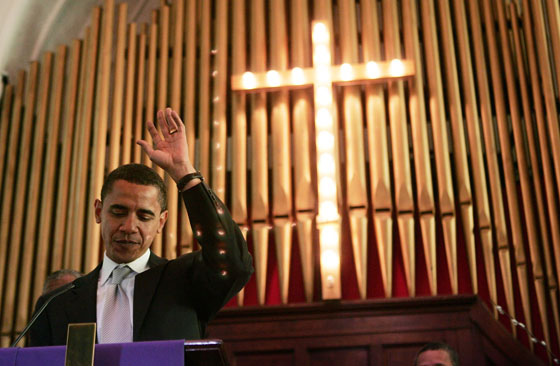
Obama an unlikely source for (surprise) spiritual leadership
given his lonely upbringing, essentially without much religion or faith input
William Henry Ruffner, a leading white Presbyterian minister of Philadelphia in the 1850s, put forward his conviction that out of all peoples, the Negro "is the kindest, brightest, gayest, and most inclined to religion. He has eloquence, grace, and a gorgeous fancy and a most touching pathos." [p 116]
The quiet alliance between the black race and white women?
George Fredrickson noted that various observers like Ruffner had commented on the natural affinity between the Negro and white women. Both suffered under the thumb of the white "lords" and slavemasters, thus both felt the sympathy of those chafing under the afflictions of tyranny. Both had a reliance on the ultimate justice of the Eternal One in heaven. Both were moved by the affections and inclinations of the heart, rather than mere intellectualism, and the false "valor" and "honor" that white man so esteemed. Yet in terms of raw spiritual courage, the Negro in fact surpassed white man, whose strength lay not in the spiritual realm of the heart and soul, but in domination, privilege, and often sheer cold-hearted brutality.
The future belongs to African forces of the heart?
Hollis Read, a white New York minister, predicted in 1864 that Africa was "reserved for the development of a higher civilization and a better type of Christianity than the world has yet seen." Citing Kinmont and the Westminster Review on the destiny of the Negro as a better Christian than the European, Read saw "the peculiar religious instincts of the people, and the facility with which they receive religious teachings" as giving substance to his prediction. [p 116] Mrs. A.M. French, a white missionary to Negroes, noted that in some of the "deep things of God" the African has much to teach white folk. "They have religious experience deep in the heart." [p 123]
A new race for a coming Golden Age?
Moncure Daniel Conway argued in 1864 that every race has its strengths and every race has its weaknesses. If the white man had intellect and ambition, the Negro people were blessed with the powers of the heart, spiritual strengths, goodness, and love. The very traits that the white man was deficient in, those were the traits that the Negro excelled at. Thus, Conway regarded race-mixing as a positive policy, stating that "the mixture of blacks and whites is good; that the person so produced is, under ordinarily favourable circumstances, healthy, handsome, and intelligent. Under the best circumstances, I believe such a combination would evolve a more complete character than the unmitigated Anglo-Saxon." [p 121]
It was inevitable, in Conway's opinion, that such a blending should occur in America; for the nation was "bound by Fate" to "rear a new race" which would also be a better one. [p 122]
The other outspoken amalgamationist was Gilbert Haven, Methodist Bishop of Massachusetts, who openly asserted at the end of the Civil War that the Negro was superior to the Caucasian. He discerned in the Negro traits of pure spirituality that far surpassed the money grubbing and pettiness of the whites. He saw in the black folk evidences of "where the sweetest fountains of grace are in this land." Of all American races and national groups, the Negro "has the most of Christ. He is the nearest to God. . . . He shall season our worldliness, selfishness, and irreligion with heavenly salt." [p 122]
Haven was openly enthusiastic about the prospect of intermarriage with a race of such virtue and true valor, maintaining that God had "emancipated them in order that He may thus reunite all mankind in one blessed brotherhood of blood and love," and adding further, as if to make his point unmistakably clear, that "The daughters of those haughty Southerners, who have shrank from their touch as leprous, shall gratefully accept the offers of the sons of their fathers' slaves." [National Sermons. Boston, 1869]
[Fredrickson, p 122]
George M. Fredrickson
The Black Image in the White Mind, 1971
